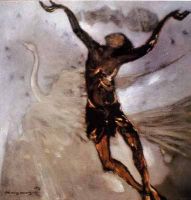The first time I ever got up to sing in public my heart was in my throat.
I had left the quiet beauty of my home in Rothesay, New Brunswick for the
uncertain excitement of full-time musical studies. Destined soon after,
I was sure, for a life on the stage. The comfort and protection of family,
friends, life by the river in Rothesay--I was eager to trade them all in
for a career in the cosmopolitan halls of Montreal and beyond. The exacting
judgements of directors and critics, the rigors of auditions, performances,
and reviews: I thought I was ready for them. Bid good-bye to training in
anonymity, I told myself. It was time to become a professional. Maybe
even star.
All of this, a libretto of ambition, ricocheted in my head as I debuted
before the audience assembled at my small undergraduate college.
Now would begin my remarkable flight.
The piece was “Quia fecit mihi magna” (For the mighty one has done great
things for me), from Bach’s Magnificat. We know the scripture passage well:
Mary’s confession of faith and her acceptance of God's will for her in
Luke Chapter 1. During the three short minutes of performance, my
mind was on anything but the meaning of the Latin text I was singing. When
I wasn't preoccupied with imminent stardom, I was wracked with fright.
Would the audience notice? Would God even notice, if (when?) I fell flat
on my face?
My heart was beating so fast I don’t know how I found the breath to sing
the
elaborate
scales that Bach demanded. Somehow, I got through it, and when it was over,
there was applause. I shuffled back to my chair ... Breathless ...
As a newly ordained Jesuit priest, I look back over the 15 years I spent
as a professional singer, and I still see that moment on stage as emblematic
of my journey in life and faith.
The performing arts seem so romantic to the outsider: Imagine! The artist
-- singer, actor, dancer -- manages to make a living out of…creativity!
Some might dream of it, but few dare and even fewer succeed. A crazy faith
in your gift and a crazy love for sharing it are required; an impossible
tolerance for work and disappointment, practically mandatory.
Despite the odds and the obstacles, finding an outlet for that creativity,
polishing the expression of his or her talent is the most important priority
for an artist or performer. We spend years, even lifetimes, refining our
gifts with training and performing. Still, while we work feverishly for
the chance to perform, every time we do step onto a stage, and realize
some small portion of our dream, we suffer a “little death.”
No matter how much training and rehearsing and experience a performer can
summon, the moment the curtain goes up on another performance, on a new
audience, he faces the unknown. Will you reach that high note at the climax
of the piece? Win even one lonely ovation? Satisfy the critic in the fourth
row? More importantly, the one in your head?
So much is uncertain. You open up yourself to all manner of criticism (from
the audience, from the impresarios and directors, and from yourself); and
you do it at a terribly vulnerable moment--just as you are delving into
your very core to free that deep truth, that deep creativity that lies
within.
It’s challenging, unpredictable and you need a thick yet porous skin to
survive it, to filter the good criticism from the bad, to breathe in nourishing
ideas and exhale the fullness of your creative potential.
The little death that a performer endures is really a metamorphosis, not
unlike the butterfly's. On the other side of that death, something courageously  new
emerges, takes flight and carries the audience away with it. Her protective
cocoon cast off, the performer's unbound and winged energy reaches into
the cocoon of each of those gathered and says, “You, too, are released." new
emerges, takes flight and carries the audience away with it. Her protective
cocoon cast off, the performer's unbound and winged energy reaches into
the cocoon of each of those gathered and says, “You, too, are released."
In this way, does God call all of us to "perform." Whether we’re at Mass
praying with the rest of the community, at home struggling to communicate
with our loved ones, in school or at work, jostled by peers, supervisors,
responsibilities, we are called to step out of our protected spheres, away
from the trappings of fear or self-interest, and into freedom, into generosity,
into a fullness of love. Imagine Jesus Christ, of whom Paul writes: "In him we live, we move
and have our being," (Phil. 2) releasing you from your cocoon, ushering
you into this fuller expression and experience of life. God beckons each
of us to listen to and follow Jesus in his great mysterious act of bursting
into new life. The desire is there in all of us, in spite of our fears
and in spite of our breathlessness (not a good thing for a singer), to
become the wonderfully creative creatures God intended.
Imagine Jesus Christ, of whom Paul writes: "In him we live, we move
and have our being," (Phil. 2) releasing you from your cocoon, ushering
you into this fuller expression and experience of life. God beckons each
of us to listen to and follow Jesus in his great mysterious act of bursting
into new life. The desire is there in all of us, in spite of our fears
and in spite of our breathlessness (not a good thing for a singer), to
become the wonderfully creative creatures God intended.
Bit by bit, if we allow God to work in us, the cocoon that shields us from
the world continues to breathe, to give way, and we emerge closer to God's
own image and likeness: Artists and workers who lend their labor and their
love to building the Kingdom on earth. Like Mary in Luke's Magnificat,
we become "handmaidens" of the Lord.
As Advent moves to Christmas, and Christmas to Lent and Easter we might
reflect on the eternity of “little deaths” in our lives; on the invitation
to come out of our cocoons;  on
those moments when we faced fear, found breath, and re-emerged renewed
and transformed into something that we were not before. on
those moments when we faced fear, found breath, and re-emerged renewed
and transformed into something that we were not before.
Surprise! When the creative spark is truly alive, the performer and the
audience, before you know it, are bursting from their cocoons in a dance
of bright wings. Christ is moving among us, and we choose, fearfully and
wonderfully, to accept the invitation to perform, to follow him onto the
holy ground of new life.
Click
image to enlarge in separate window. 
Eric
Oland is a Jesuit priest and a member of the Upper Canada Province.
At
the time of writing this short reflection,
he
was studying at Weston Jesuit in Cambridge, Mass.
|

